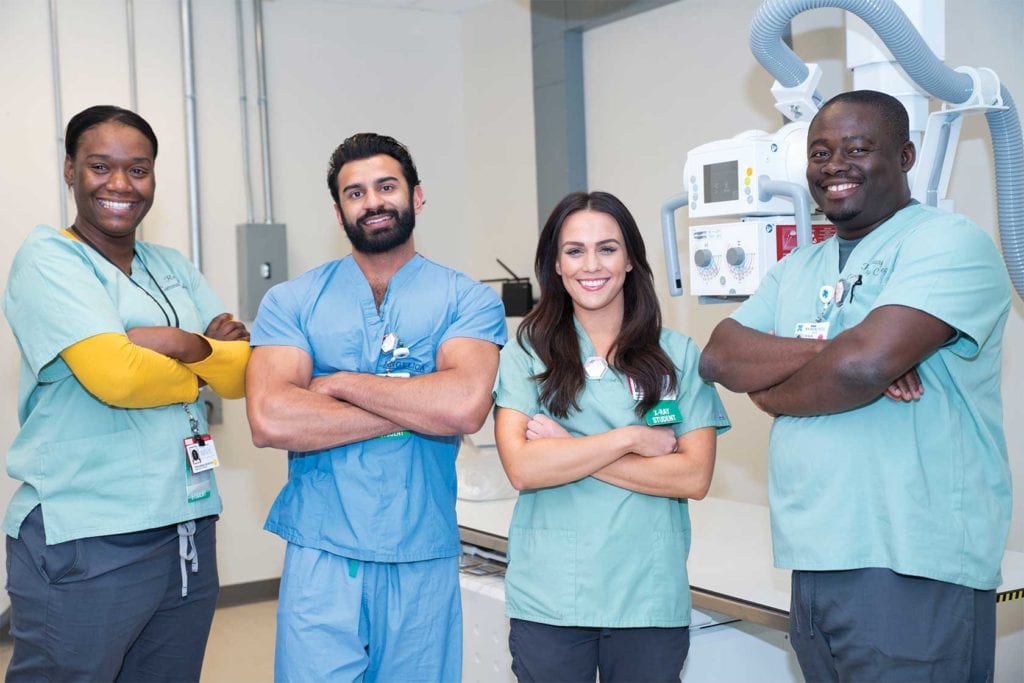Healthcare Programs at Roxbury Community College
Preparing Future Healthcare Leaders for Success

At RCC, we take pride in preparing students with the knowledge and skills needed for immediate career success or transfer to four-year schools. RCC offers a suite of health science programs including nursing, radiologic technology, phlebotomy, clinical medical assistant, and medical billing and coding. All programs are designed to meet current workforce needs, and the College regularly meets with industry leaders to update program curricula and ensure students have access to the best clinical sites in Boston. RCC has a longstanding tradition of preparing students for immediate employment in the field of healthcare.
RCC’s NEW Nursing Program
At a time when COVID-19 has revealed a greater need for skilled healthcare workers, the state Board of Registration in Nursing (BORN) has granted initial approval to Roxbury Community College (RCC)’s new Nursing Program.

Nursing students complete coursework and simulations in our state-of-the-art health sciences building, which includes a nursing simulation lab and mock hospital. PHOTO: RCC
“Nurses are the lifeblood of any community, especially during the pandemic,” says RCC President Dr. Valerie Roberson. “RCC is honored to have the opportunity to provide a quality nursing program at an affordable price for our students.” RCC students will be able to start their two-year journey to an Associate in Science in Nursing degree in the fall of 2021.
The RCC Nursing Program is led by Director of Nursing Stephanie Victoria, who started in August. “My goal is to deliver a high-quality nursing program that serves as a social justice vehicle benefiting the students, their families, and ultimately the community,” says Victoria. “RCC’s Nursing Program will embody academic social responsibility by increasing the amount of competent, caring, and inquisitive nurses available to the community. At the end of the program, our students will possess the self-efficacy needed to engage, address, and ultimately work towards eliminating healthcare disparities.”
Applications to the Nursing Program should be submitted by April 15, 2021.
Meet the Staff
Stephanie Victoria, Director of Nursing
Our Director of Nursing, Stephanie Victoria, prides herself on being a Massachusetts-educated nurse. She has experience building a solid career in a state that dominates the healthcare industry, and she is committed to supporting our students towards licensure and beyond.
Victoria joined RCC, in part, because of the College’s commitment to providing a top-quality education at an affordable cost. Victoria’s own life is testament to the rewards of cost-effective education. She studied at Simmons University for her BSN and opted to continue her education at UMass Dartmouth, where she earned a master’s degree in Community Health with a specialization in Education. As a mother, Victoria recognizes the impact student debt can have on an entire family’s resources. Her children, who were born after her career started, benefit from her choice to pursue an affordable education.
Victoria wants RCC nursing students to have a broader understanding of healthcare careers. Over the course of her own career, she has become more familiar with important healthcare positions outside of nursing, such as phlebotomists and radiographers. “These are also competitive professions in the medical field,” says Victoria. “Community colleges offer students affordable options that lead them directly to workforce opportunities.”
GET IN TOUCH: For more information on the Nursing Program, including the new curriculum and admissions criteria, please visit rcc.mass.edu/nursing-program or contact Director Stephanie Victoria at svictoria@rcc.mass.edu.
Radiologic Technology
RCC’s Radiologic Technology Program is a full-time, two-year Associate in Science degree program providing professional training for radiologic technologists. Radiologic technologists work in a professional environment at a hospital, clinic, or private office. Upon completion of the program, graduates will have obtained the knowledge and skills expected of entry-level radiographers per the American Registry of Radiologic Technologists (ARRT) and will be eligible to take the national radiology exam, a prerequisite to seeking employment as a registered entry-level radiographer.
Graduates who successfully pass the national exam become licensed in the state of Massachusetts and work in hospitals, clinics, medical offices, and other healthcare settings. Graduates will also be eligible for advanced certification in specialty areas, such as Mammography, Computed Tomography (CT), or Magnetic Resonance Imaging (MRI). In addition to practice, graduates may choose to continue their education at the university level for advanced allied health education, administration, or research.
Meet the Staff
Gary L’Abbe, JR., MHA, CNMT, RT(R)(N)(CT), Radiologic Technology Director
Gary L’Abbe, Jr. knows firsthand that a rewarding career can start with earning an associate degree in Radiologic Technology. We were thrilled when he joined RCC in June as our new Radiologic Technology Program Director. With years of industry experience, L’Abbe recognizes that skilled radiographers are in high demand and supports our students in the pursuit of their career goals.
Radiologic technologists work closely with physicians and radiologists to provide an important service in the healthcare industry. “It’s one of the associate degree programs that offers a sustainable career with real growth potential,” L’Abbe says.
“If you have a passion for helping people, enjoy technology, and like working with your hands, there’s no better career.”
GET IN TOUCH: For more information on the Radiologic Technology program, visit rcc.mass.edu/rad or contact Director Gary L’Abbe, Jr. at glabbe@rcc.mass.edu.
Short-Term Certificate Programs
Now more than ever, enrolling at RCC provides a flexible and affordable path towards a new career. Each of our short-term, professional education programs geared toward healthcare professions is designed to meet Boston’s growing workforce needs. RCC provides one-on-one support throughout the enrollment process, and from enrollment to certificate completion, you will continue to receive individual guidance from our team of experienced administrators. With small class sizes, there is a balance of cooperative learning as well as individual time with the instructor in every course.
Clinical Medical Assistant This course introduces students to the clinical responsibilities within hospital settings. Topics covered include preparing patients for examination and treatment, venipuncture, and EKG. Students will learn routine laboratory procedures, as well as stress and diagnostic testing. The program also covers ethics and the legal aspects of healthcare.
Medical Billing and Coding This course introduces students to ICD-10 guidelines, basic claims processes for medical insurance and third-party reimbursements, and specialty fields such as surgery, radiology, and laboratory. Students will become familiar with user manuals (CPT, ICD-10, and HCPCS) and learn how to match services and codes. They will also learn to solve insurance billing problems, manually file claims, complete common insurance forms, trace delinquent claims, appeal denied claims, and streamline billing procedures.
Pharmacy Technician This course introduces students to the theoretical knowledge and hands-on training necessary to work as pharmacy technicians in retail, hospital, and fulfillment pharmacy settings. Topics include the history of medicine, pharmacy terminology, prescription processing, compounding, inventory management, and state and federal pharmacy regulation. RCC offers this course in partnership with CVS Pharmacy.
Phlebotomy This course introduces students to medical terminology, human anatomy and physiology, OSHA regulations, bloodborne pathogens, universal precautions, ethics, and applicable law. Students will familiarize themselves with test requirements, tube identification, procedures, and protocols for lab safety.
GET IN TOUCH: For more information on short-term certificate programs at RCC, visit rcc.mass.edu/cwd or contact Executive Director Salvador Pina at spina@rcc.mass.edu or Assistant Director Evelyn Everton at EEverton@rcc.mass.edu.






![Banner [Virtual] Art Gallery](https://baystatebanner.com/wp-content/uploads/2024/04/Cagen-Luse_Men-at-store-e1713991226112-150x150.jpg)



